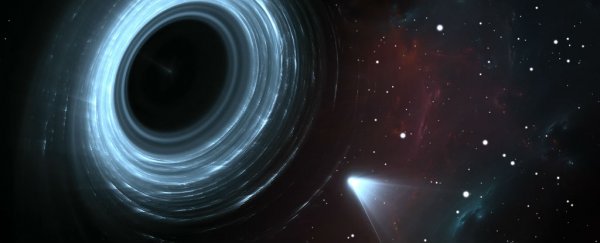Time travel seems much more common in science fiction than it is in reality. We've never met anyone from the future, after all. But all of the physics we know indicates that wormholes - another science fiction favourite - could really be used to travel backwards in time.
And according to a paper by Chinese physicists, using wormholes for time travel might actually allow us to beat Heisenberg's uncertainty principle - described as one of the most famous (and probably misunderstood) ideas in physics - and even to solve some of the most difficult problems in computer science.
Wormholes are like portals between two places in the Universe. If you fell in one side, you'd pop out the other immediately, regardless of how far apart the two sides were. But wormholes are also like portals between two times in the Universe. As Carl Sagan liked to say, you wouldn't just emerge somewhere else in space, but also somewhen else in time.
If two sides of a wormhole were close enough together, you might even be able to stop yourself from falling in. You could emerge back in time, run over to the version of you about to step into the wormhole, and tackle them to the ground.
Doing this would make what's called a closed timelike curve, or CTC - and it would cause some logical issues. I mean, if you stop yourself from jumping into the wormhole, then how did you jump in in order to emerge from the other side and tackle yourself?
This is a version of the grandfather paradox, where you've done something after travelling back in time to make yourself unable to travel back in time, which makes you unable to stop yourself, which makes you able to stop yourself, and so on.
Physicists know that the paradoxical nature of CTCs makes them have some cool properties. You can use them to do things like measure the properties of particles better than Heisenberg's uncertainty principle says you should be able to, and you can even solve computational problems that quantum computers don't even allow you to solve.
But they still have those annoying paradoxes, and physicists don't like paradoxes.
So they came up with alternatives called open timelike curves, or OTCs. OTCs still let you travel back in time, but they require that the Universe conspire to always make wormholes far enough apart that you could never, no matter what you did, stop yourself from falling in. You might be able to emerge and watch yourself, but you couldn't do a thing about it. Paradox averted.
But can OTCs do all of the cool things that CTCs can do? A team led by Mile Gu from Tsinghua University in Beijing, China decided to find out.
First, they looked at the measurement thing: whether an OTC could be used to measure the properties of a bunch of particles to unlimited precision. In regular quantum mechanics, all measurements are limited by Heisenberg's uncertainty principle, which puts a fundamental limit on what we can know about a particle.
But Gu's group showed that if you take advantage of the way that particles can be synchronised with each other before entering an OTC, all of the particles will emerge from the other side of the wormhole just about exactly lined up with one another.
Heisenberg says that you can't measure any individual particle to unlimited precision, but measuring each member of the whole group would allow researchers to beat this fundamental limit. It's like how one flip of a coin can't tell you if the coin has heads on both sides, but 1,000 flips later, you can be pretty sure.
Then the team went one better. They showed that very similar systems could be used as computers - computers that would work even better than quantum computers. Some of the hardest computational problems are ones where we just have to try all of the answers that we can think of, see which one works the best, and hope that we didn't forget to try one that would've worked even better.
Quantum computers won't even always be able to master these kinds of problems, but physicists had shown that CTCs could. And now, Gu's team showed that OTCs could too.
All of this, of course, is only really useful if wormholes (or some other means of time travel) exist. They're as much a consequence of the laws of physics as black holes are, so it seems like they should be out there somewhere.
Astronomers, cosmologists, and particle physicists are doing their best to scan the Universe for them. If they ever do find a wormhole, whether it lets you tackle your past self or not, physicists would be able to use some of these remarkable properties to measure and compute in ways that seem impossible everywhere else in the Universe.
The paper has been published in NPJ Quantum Information.
